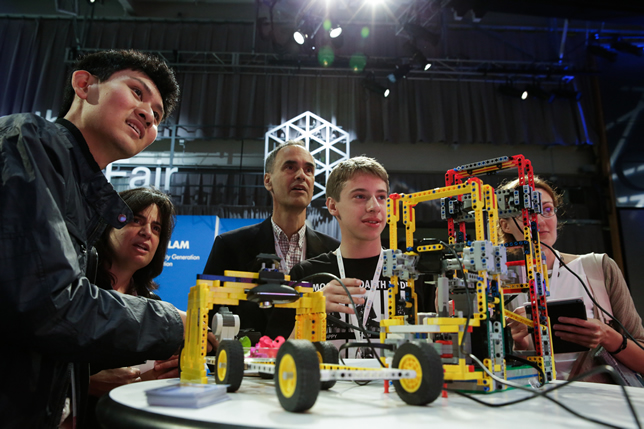Google Science and Engineering Fair Spurs Student Innovations
- By Dian Schaffhauser
- 03/02/15
The Google Science Fair has opened for entries. Students from 13 to 18 almost anywhere in the world can submit their projects online. Topics cover 14 science and technology areas and run from astrophysics to robotics. The science fair site also includes age-specific lesson plans and worksheets to be used by teachers who want to work with their own students in developing projects.
The format for the projects can follow one of two tracks. The first is the standard scientific method: The student poses a question and hypothesis, gives an account of the research followed, explains how the experiment was carried out, describes the results and offers a conclusion. Or the student can follow the engineering design process: defining the problem, doing research, specifying requirements, brainstorming solutions, choosing the best solution, doing development work, building a prototype and testing and redesigning.
However, the Google touch is also evident in this competition. Entrants must possess a Google account; and they're encouraged to post sub-two-minute videos on YouTube or a slideshow on Google Slides.
Judging will include multiple criteria such as how "inspirational" the entry or idea is and its capacity to "make an impact."
Prizes include major scholarships ($50,000 for the grand prize winner, for example), "goodie" bags from LEGO Education and Google, mentoring from Scientific American, a National Geographic expedition to the Galápagos Archipelago, five-figure project funding, tours of the Virgin Galactic space center and classroom grants.

Last year's winners featured projects on wearable sensors "for [aging] society," cleaning up oil sands waste, converting breath to speech for the disabled, and the use of natural bacteria to combat world hunger, among many others.
The submission deadline is May 19, 2015. Ninety regional finalists will be announced in July, global finalists in August, and winners in September. Twenty finalists and their parents or guardians will travel to Google headquarters in Mountain View, CA to present their project to the judges and compete for all of the awards.
About the Author
Dian Schaffhauser is a former senior contributing editor for 1105 Media's education publications THE Journal, Campus Technology and Spaces4Learning.